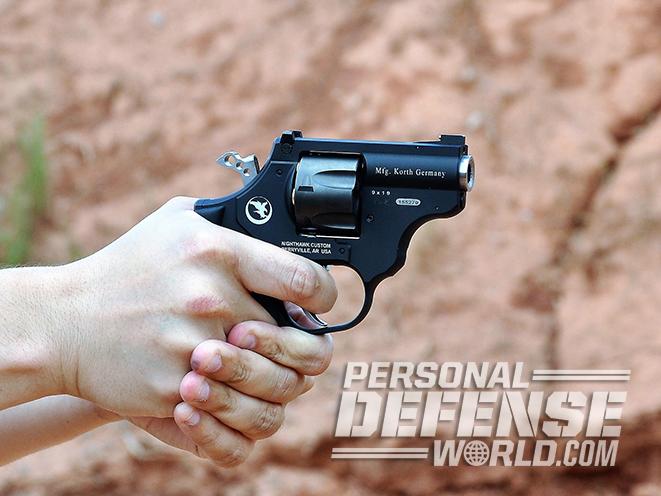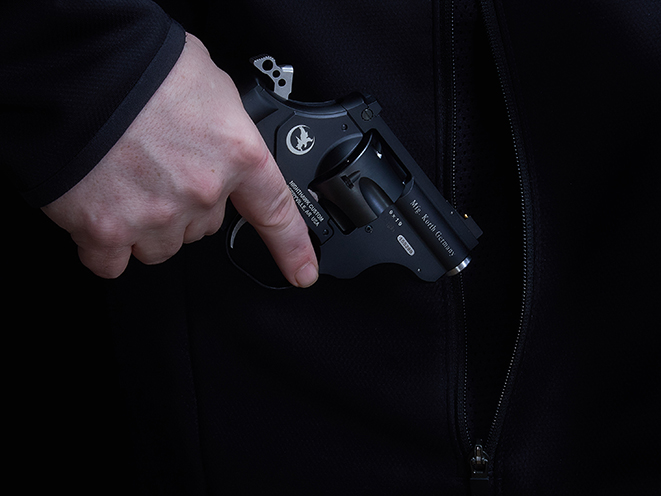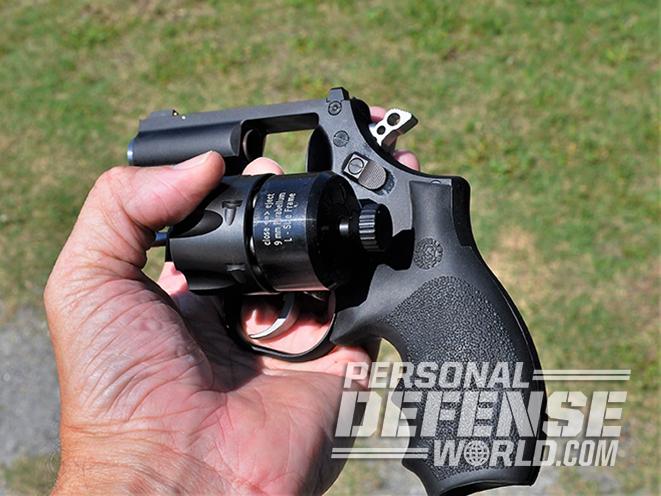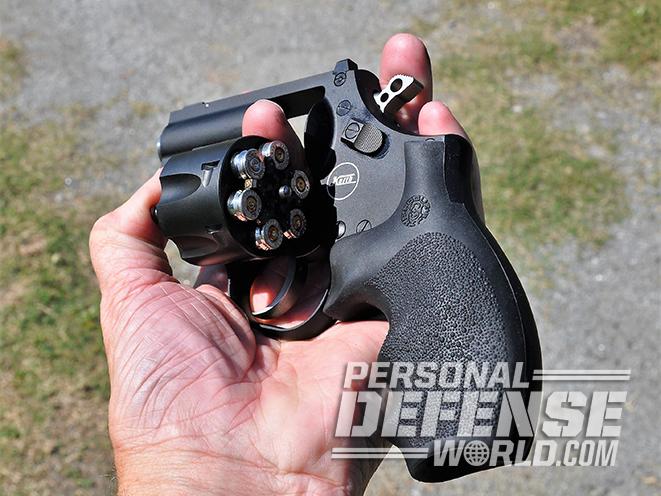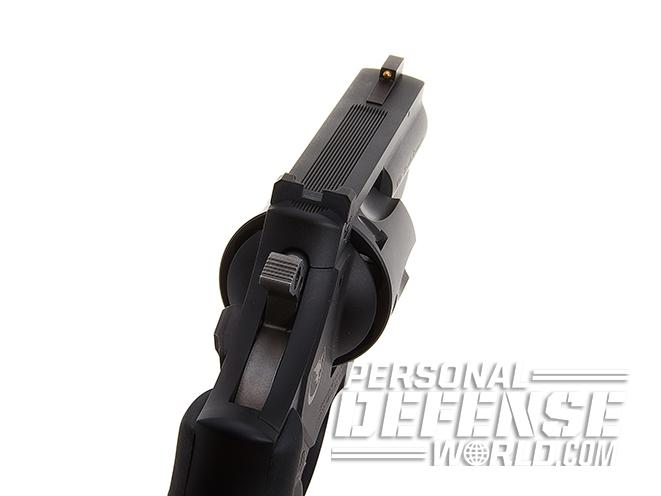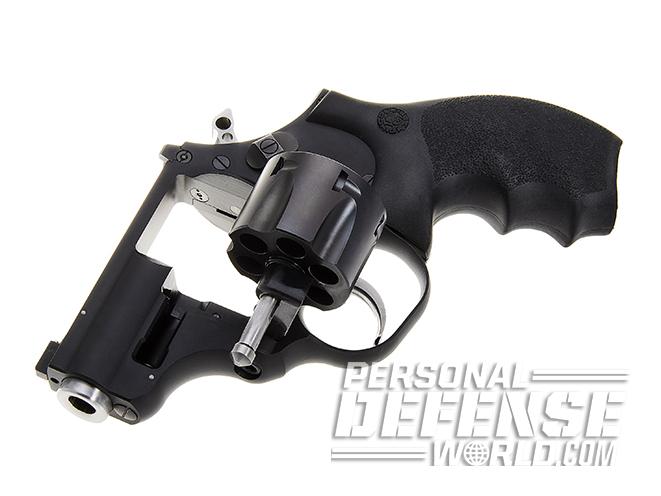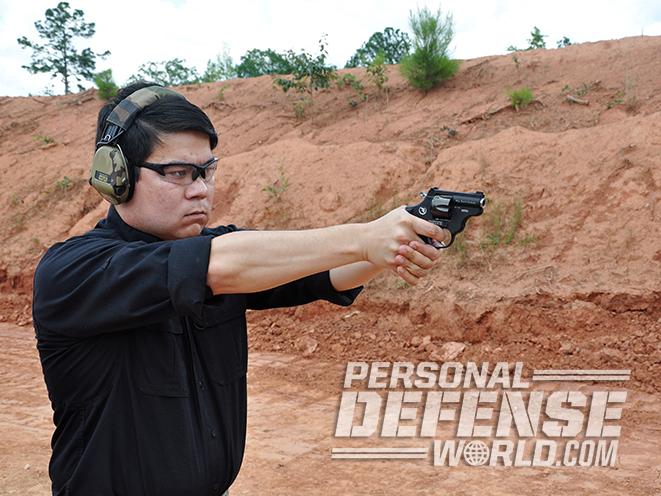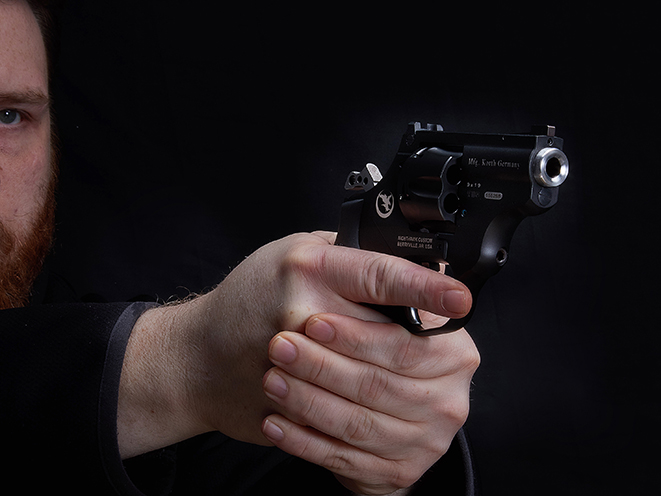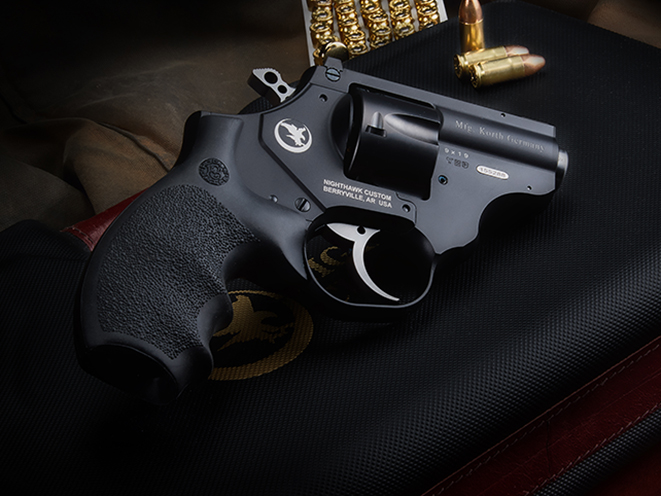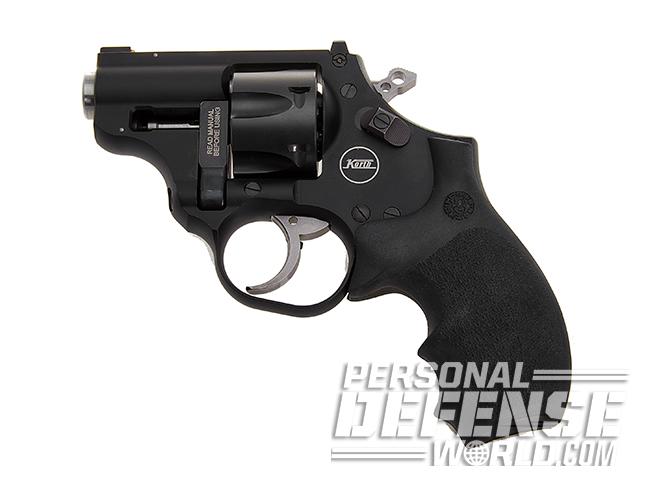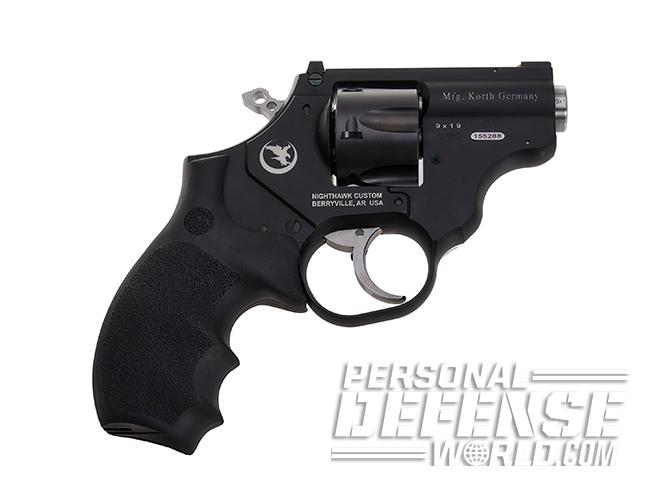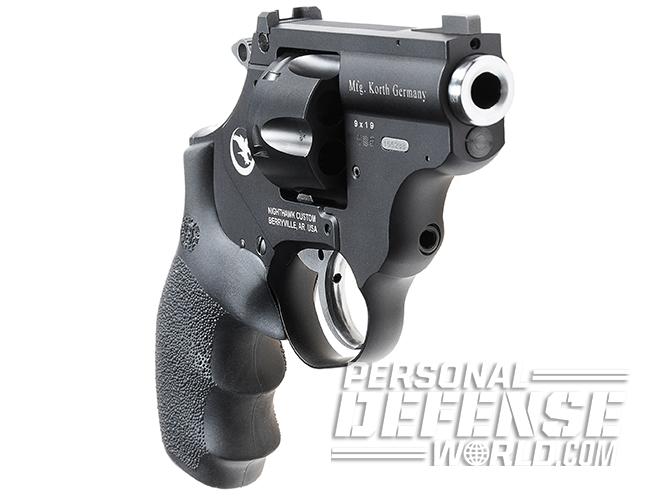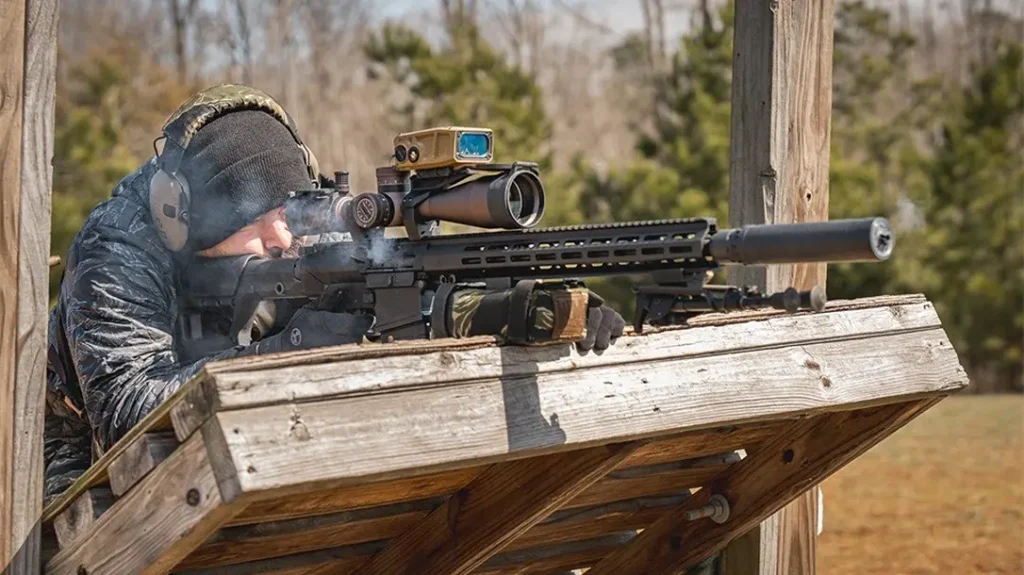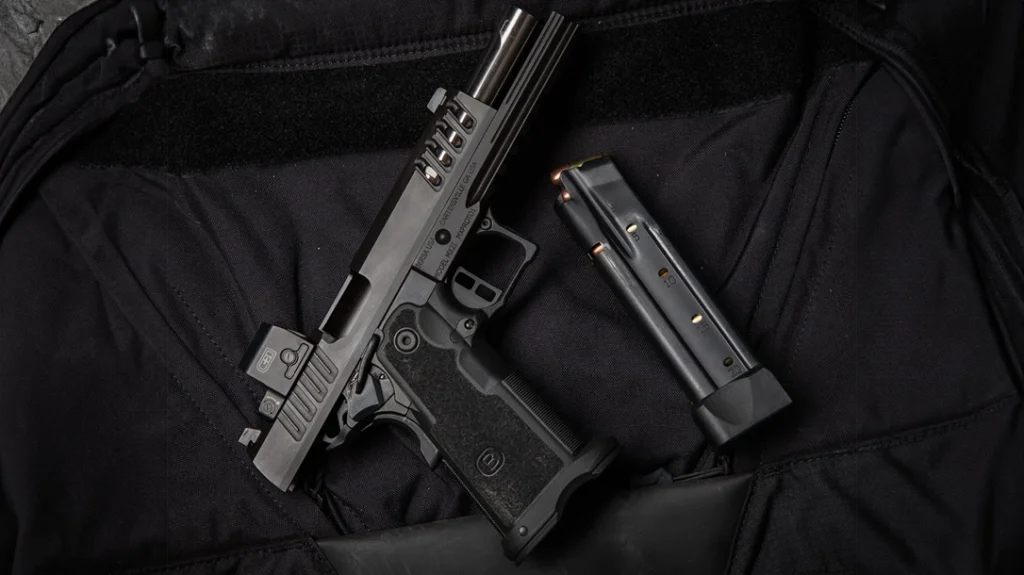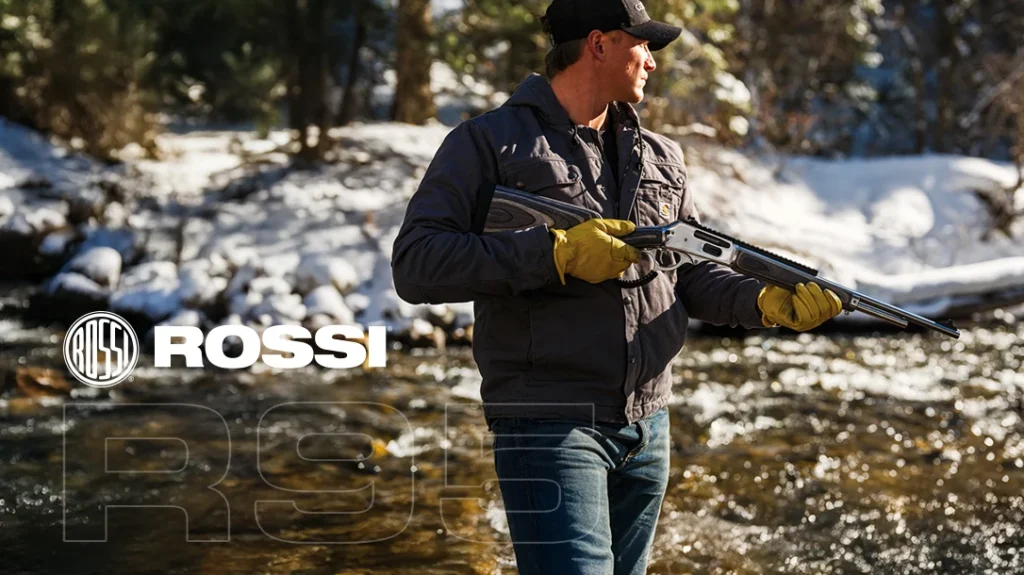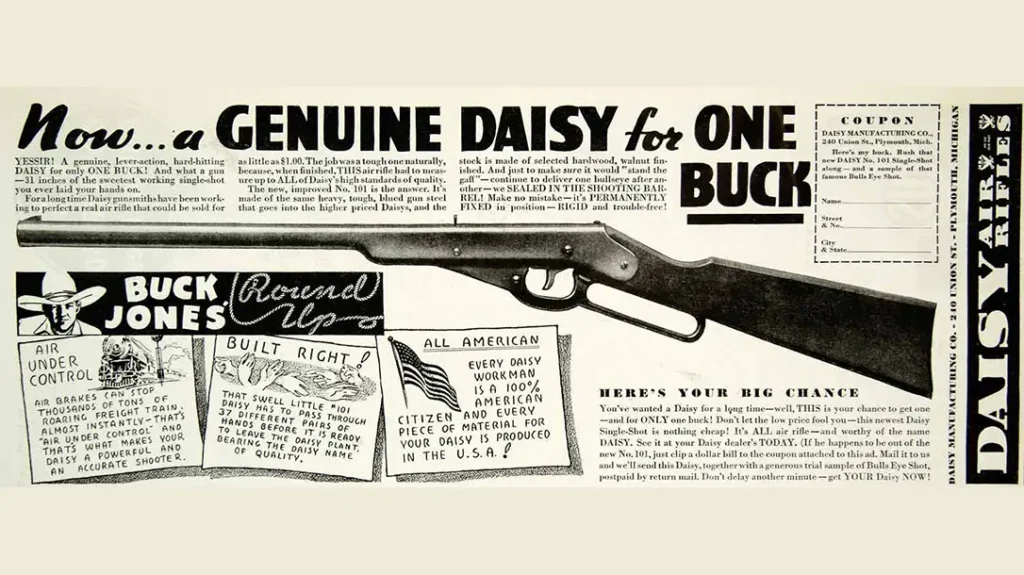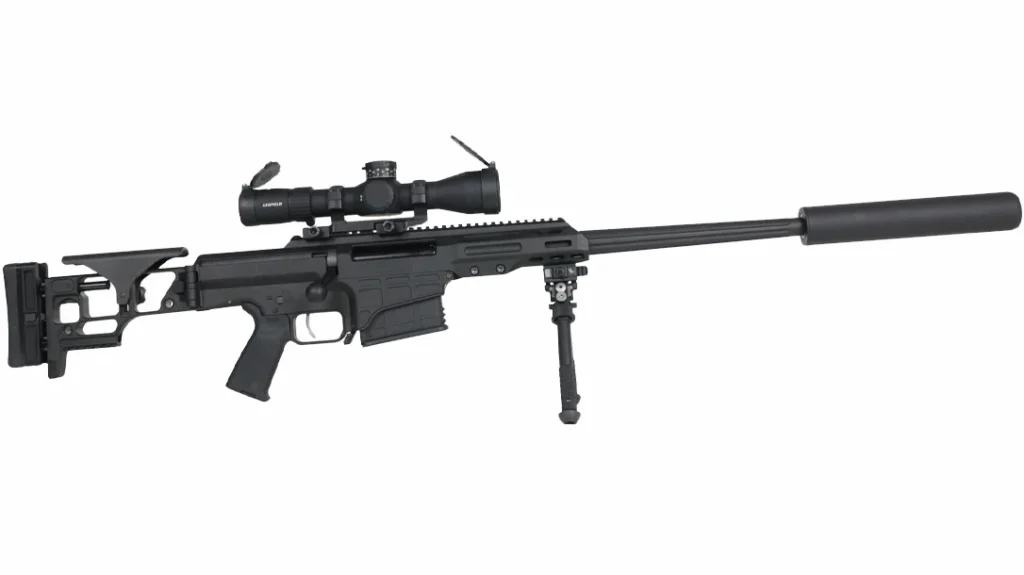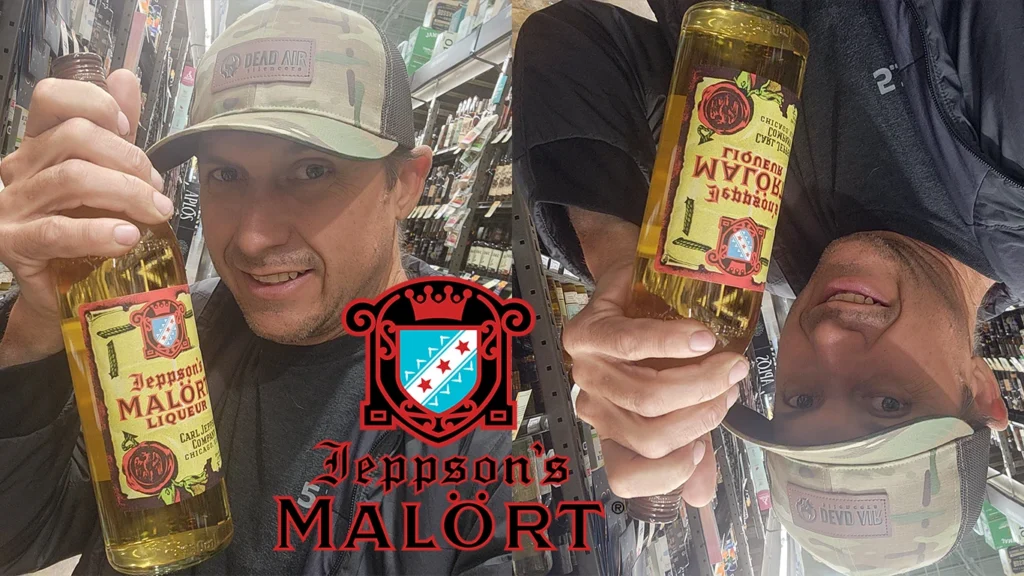Since opening its doors in 2004, Nighthawk Custom has grown to become a premier manufacturer of custom 1911 pistols. Two years ago, Nighthawk stepped outside the box and collaborated with Browning to offer a customized Hi-Power. This became an unqualified success, with demand outstripping the supply. In 2016, Nighthawk announced another collaboration, this time with Korth of Germany. The announcement was greeted with enthusiasm from revolver aficionados, many of whom were intrigued by the unique design and German engineering. Of the three models now available—the Super Sport, Mongoose and Sky Hawk—the little Sky Hawk revolver interested me the most. I immediately requested one for evaluation. Unfortunately, it was the last model to be imported, so I had to wait for my sample.
The Sky Hawk revolver is a modified version of Korth’s 9mm Sky Marshal. According to Korth’s website, the Sky Marshal is offered with either a 2- or 3-inch barrel. The most obvious difference between the Sky Marshal and the Sky Hawk is the profile of the leading edge of the frame. The Sky Hawk’s frame has been scalloped to produce a sleeker and lower profile. The other noticeable difference is the absence of the accessory rail on the side of the frame and barrel on the Sky Hawk.
Bird Of Prey
The Sky Hawk revolver is shipped with a padded hard case, a Korth speedloader and a thorough instruction manual. The photos in the manual show a Sky Hawk with the modified frame profile but a 3-inch barrel. A call to Nighthawk’s CEO, Mark Stone, revealed that the Sky Hawks are imported with a 3-inch barrel in order to meet the requirements of the BATFE’s point system. Nighthawk then cuts and re-crowns the barrel. The Sky Hawk is also chambered in 9mm and uses a unique cylinder star and ejector that eliminates the need for moon clips. I found it interesting that a machined aluminum dowel is also included, presumably to remove stuck cases or projectiles.
Advertisement — Continue Reading Below
Since this is an imported pistol customized and sold by Nighthawk, the BATFE requires very specific markings. “Mfg. Korth Germany” is engraved on the right side of the barrel while “Nighthawk Custom Berryville, AR USA” is engraved on the right side of the frame, just above the trigger. The Nighthawk logo is on the right side of the frame, and the Korth logo is etched on the left side, under the cylinder release. The serial number is a steel insert that is located on the right side of the frame, just under the barrel. Overall, the markings, while a little busy, are tastefully done and meet the import requirements.
Every part of the revolver is machined from either billet steel or aluminum. The Sky Hawk has a monolithic frame that is machined from 7075-T6 aluminum and includes the barrel shroud. The AISI 4340 stainless steel barrel is threaded inside the shroud and extends approximately 0.3 inches. The Sky Hawk weighs 19.86 ounces unloaded and has an overall length of 6.3 inches and a height of 5.12 inches.
- RELATED STORY: Nighthawk-Korth Revolvers – The Wheelgun Has Landed
The dimensions make the Sky Hawk slightly shorter in length than my S&W Model 442, but 1.25 inches taller in height. The best overall size comparison is a 2.5-inch-barreled S&W Model 66/19. Like a Smith & Wesson, the Sky Hawk’s cylinder rotates in a counterclockwise direction, and the cylinder release is pushed in a forward/upward direction.
Advertisement — Continue Reading Below
Externally, the Sky Hawk revolver features a robust rear sight that is adjustable for windage and a gold bead insert in the front sight. The front sight is replaceable by removing a setscrew in the face of the barrel shroud. The hammer features two lightening holes. The trigger is polished and contoured with no offensive serrations or sharp edges. The double-action (DA) trigger pull averaged 10.4 pounds while the single-action (SA) pull averaged a crisp 4.18 pounds with minimum overtravel.
A Hogue Monogrip with finger grooves is installed for good control and better traction. The butt of the frame also has a recessed pin for the use of a lanyard. Finally, all of the edges on the Sky Hawk have been softened or radiused. The aluminum frame is finished in matte black hardcoat anodizing while the steel cylinder is coated with a DLC finish.
Rolling Forward
So what makes a Korth so special? I can tell you that I wasn’t going to pop the revolver’s sideplate to find out. To answer that question, I called Allen Wyatt, Nighthawk’s resident Korth expert. Wyatt is the lead gunsmith on the project, and he traveled to Korth’s factory in Germany to learn the ins and outs of the pistols.
Advertisement — Continue Reading Below
Allen explained that the Korth action features a roller on the trigger that comes into play when the pistol is fired in DA mode. Instead of friction between two flat surfaces, as on a Smith & Wesson, the roller engages and rides on the hammer tongue. This results in a very smooth action. The roller can be changed out to provide a “two-stage” trigger with a very distinct wall before it breaks. Other internal design features include an adjustable trigger return spring that can be tuned with a tensioner without compromising reliability.
Wyatt also went into detail describing the ejection system. First, each round sits in a fully machined chamber, as with a semi-auto pistol. Second, the ejector features six retracting fingers, one for each cylinder or chamber. As the ejection rod is depressed, the fingers extend to engage the rim of the cartridge. Interestingly, the ejection rod does not rotate with the cylinder, as on an S&W.
My first impression of the Korth was based on a lifetime of shooting S&W revolvers. When I first dry-fired the Sky Hawk revolver, my impression was that the action tended to stack and did not feel consistent. After the first range trip, I sat down to diagnose what I was feeling. I determined that the timing on the Korth locks the cylinder much earlier than on an S&W. This results in a tactile bump and an audible click in the action. Also, unlike an S&W, after the cylinder locks, the Korth has a longer trigger pull before it breaks. This difference was a distraction that was easily overcome once identified. I initially found that the Korth action was very tight, but it smoothed up with several range trips and dry-firing sessions.
Advertisement — Continue Reading Below
Trigger Time
On the range, I tested the Sky Hawk revolver with nine premium personal-defense loads with a wide range of bullet weights and velocities. The Sky Hawk handled all of the loads with ease, and the Hogue rubber grip did an excellent job of absorbing recoil.
My shooting impressions were very positive, and the Sky Hawk attracted a good bit of attention on the range. I did find that the Super Vel 90-grain +P JHP cases tended to stick in the tight chambers of the cylinder. But I used the provided dowel to punch them out without any issues. This reinforces the need to test any ammunition before carrying it for personal defense. The Gorilla and Federal loads were two of my favorites, and the Sig 147-grain V-Crown JHPs and Speer 147-grain Gold Dot HPs were also easy shooting.
For the required accuracy tests, I shot the Sky Hawk revolver in DA mode from 15 yards. All of the groups were tighter than 2 inches. But I did experience one serious ammo-related issue. When using the new Federal American Eagle 115-grain Syntech training ammunition, I had a projectile back out of the case under recoil. This load features a polymer-encapsulated bullet, and the factory crimp was not sufficient to hold the projectile under the recoil of a revolver. This isn’t an issue with semi-automatic pistols—it is endemic to revolvers. The same issue has been observed with S&W’s small-framed .357 Magnum wheelguns.
Advertisement — Continue Reading Below
Next, I shot several drills from various ranges until I exhausted my ammunition supply. Engaging a steel silhouette from 45 yards proved easy as long as I did my part. I shot a sub-4-second Bill Drill from 7 yards and placed every round inside the A-zone. I did find that the ejection rod only extracted approximately 0.13 inches of the 9mm case, so I had to rely on gravity to complete the full ejection process. Even when the muzzle was held in a vertical position, there was no guarantee that all six spent cases would fall free. I should note that this is not isolated to the Korth and the same issues apply to the popular S&W J-Frames and other snubbies.
Making The Grade
Due to the lack of a proper holster, I wasn’t able to carry the Sky Hawk revolver or do any presentations at the range. But, overall, I was impressed with the design and engineering of this model. The Korth line is certainly unique and has appealed to those loyal to the Nighthawk brand.
Some months back, I had the opportunity to visit with Nighthawk’s Mark Stone to discuss the Korths and other projects the company has in the works. Mark asked for my impression of the revolvers, and especially the Sky Hawk. My comments were “mostly favorable,” however, as Mark knows, there is always a “but.” In this case, I softly castigated him for a $25 rubber grip on a premium revolver that costs $1,699! The Sky Hawk deserves a set of Hogue Bantam grips in rosewood or cocobolo.
Advertisement — Continue Reading Below
Based on the interest generated at the SHOT and NRA shows this year, Nighthawk Custom seems to have another winner in its lineup. Given the timely import process, I suggest that anyone interested in a Sky Hawk get their order in, or better yet, buy the first one you see.
Sky Hawk Revolver Specs
| Caliber: 9mm |
| Barrel: 2 inches |
| OA Length: 6.3 inches |
| Weight: 19.86 ounces (empty) |
| Grips: Hogue Monogrip |
| Sights: Gold bead front, adjustable rear |
| Action: DA/SA |
| Finish: Matte black |
| Capacity: 6 |
| MSRP: $1,699 |
This article was originally published in “Pocket Pistols” 2018. To order a copy, go to outdoorgroupstore.com.
